Company Law: Legal Analysis of Agency and Principal Relationships
VerifiedAdded on 2022/08/28
|9
|2417
|30
Case Study
AI Summary
This case study delves into the intricacies of company law, specifically focusing on the legal implications of an agency relationship. The scenario involves Philip, who owns televisions, and Andrew, who is tasked with selling them. Andrew sells the televisions but withholds some of the proceeds and also sells one to Philip's enemy, raising questions about Andrew's honesty and adherence to his responsibilities as an agent. The analysis applies key legal principles of agency, referencing landmark cases such as Ireland v Livingstone, Chan Yin Tee v. William Jacks and Co., and Watteau v Fenwick to determine Andrew's obligations and Philip's rights. The study examines the concepts of actual and implied authority, as well as the responsibilities of agents to act in good faith and with the principal's best interests in mind. The case explores whether Philip is bound by Andrew's actions, even if he was unaware of them, and the potential legal recourse available to Philip against Andrew's actions, including the violation of his duties and the unauthorized sale of the television.
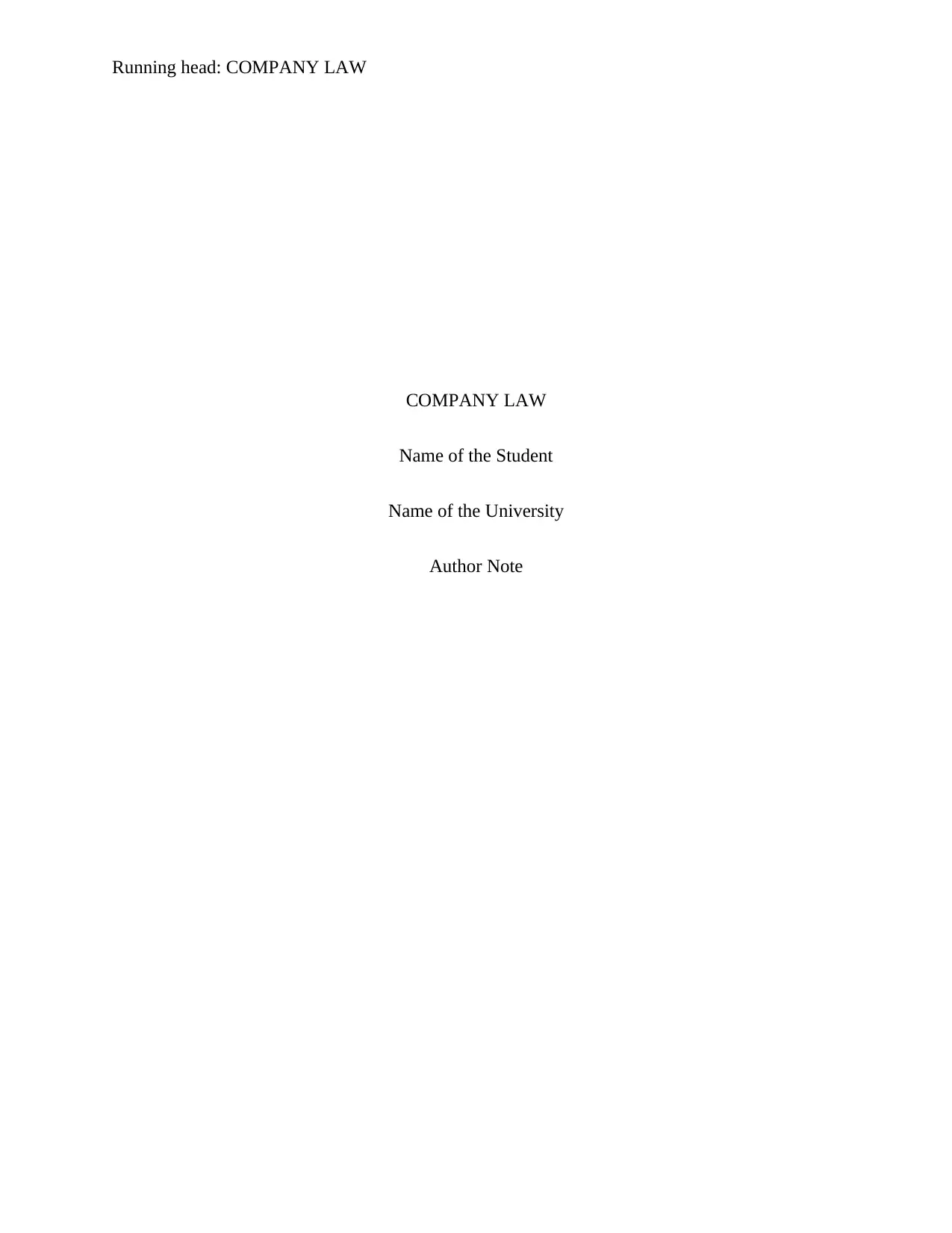
Running head: COMPANY LAW
COMPANY LAW
Name of the Student
Name of the University
Author Note
COMPANY LAW
Name of the Student
Name of the University
Author Note
Paraphrase This Document
Need a fresh take? Get an instant paraphrase of this document with our AI Paraphraser
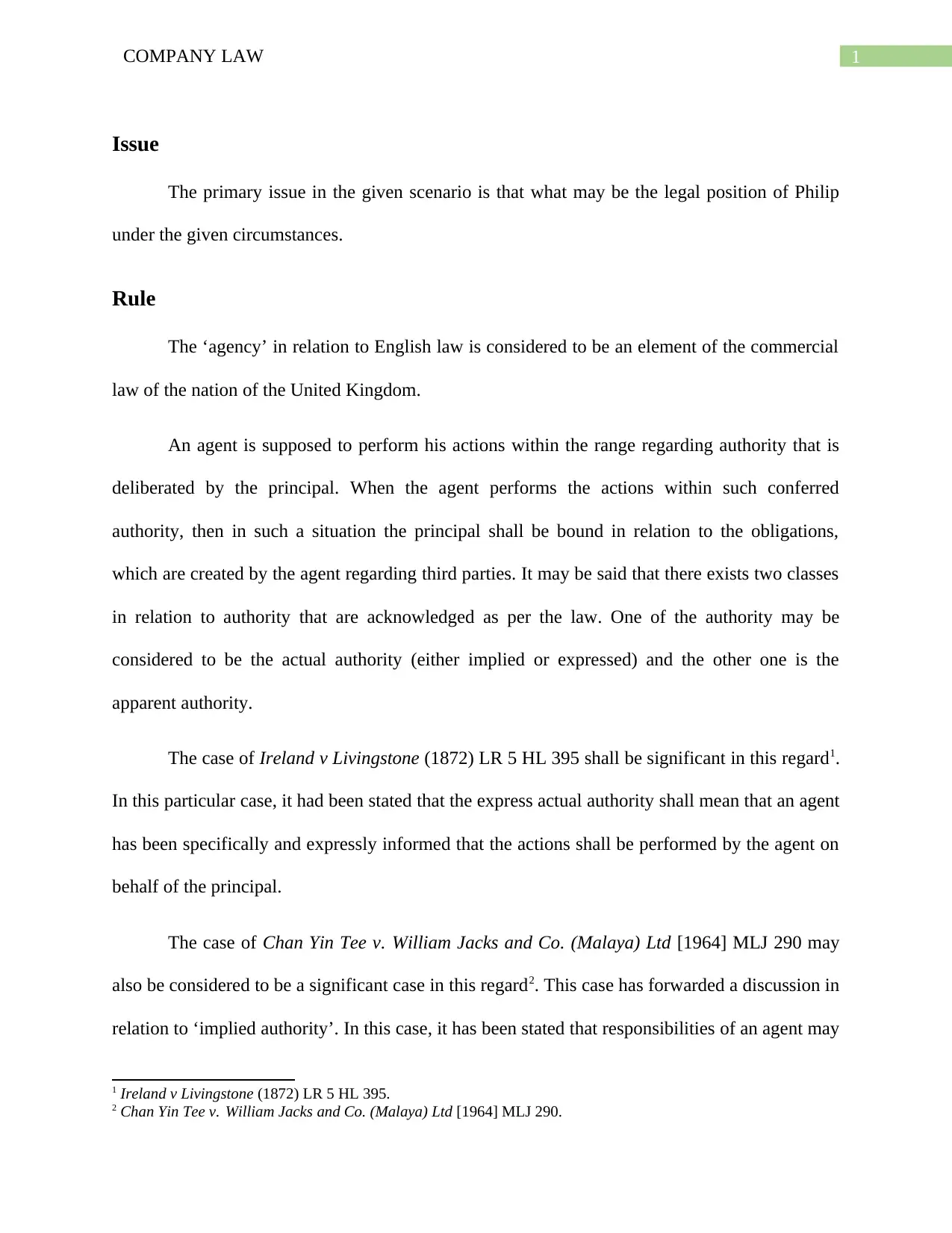
1COMPANY LAW
Issue
The primary issue in the given scenario is that what may be the legal position of Philip
under the given circumstances.
Rule
The ‘agency’ in relation to English law is considered to be an element of the commercial
law of the nation of the United Kingdom.
An agent is supposed to perform his actions within the range regarding authority that is
deliberated by the principal. When the agent performs the actions within such conferred
authority, then in such a situation the principal shall be bound in relation to the obligations,
which are created by the agent regarding third parties. It may be said that there exists two classes
in relation to authority that are acknowledged as per the law. One of the authority may be
considered to be the actual authority (either implied or expressed) and the other one is the
apparent authority.
The case of Ireland v Livingstone (1872) LR 5 HL 395 shall be significant in this regard1.
In this particular case, it had been stated that the express actual authority shall mean that an agent
has been specifically and expressly informed that the actions shall be performed by the agent on
behalf of the principal.
The case of Chan Yin Tee v. William Jacks and Co. (Malaya) Ltd [1964] MLJ 290 may
also be considered to be a significant case in this regard2. This case has forwarded a discussion in
relation to ‘implied authority’. In this case, it has been stated that responsibilities of an agent may
1 Ireland v Livingstone (1872) LR 5 HL 395.
2 Chan Yin Tee v. William Jacks and Co. (Malaya) Ltd [1964] MLJ 290.
Issue
The primary issue in the given scenario is that what may be the legal position of Philip
under the given circumstances.
Rule
The ‘agency’ in relation to English law is considered to be an element of the commercial
law of the nation of the United Kingdom.
An agent is supposed to perform his actions within the range regarding authority that is
deliberated by the principal. When the agent performs the actions within such conferred
authority, then in such a situation the principal shall be bound in relation to the obligations,
which are created by the agent regarding third parties. It may be said that there exists two classes
in relation to authority that are acknowledged as per the law. One of the authority may be
considered to be the actual authority (either implied or expressed) and the other one is the
apparent authority.
The case of Ireland v Livingstone (1872) LR 5 HL 395 shall be significant in this regard1.
In this particular case, it had been stated that the express actual authority shall mean that an agent
has been specifically and expressly informed that the actions shall be performed by the agent on
behalf of the principal.
The case of Chan Yin Tee v. William Jacks and Co. (Malaya) Ltd [1964] MLJ 290 may
also be considered to be a significant case in this regard2. This case has forwarded a discussion in
relation to ‘implied authority’. In this case, it has been stated that responsibilities of an agent may
1 Ireland v Livingstone (1872) LR 5 HL 395.
2 Chan Yin Tee v. William Jacks and Co. (Malaya) Ltd [1964] MLJ 290.
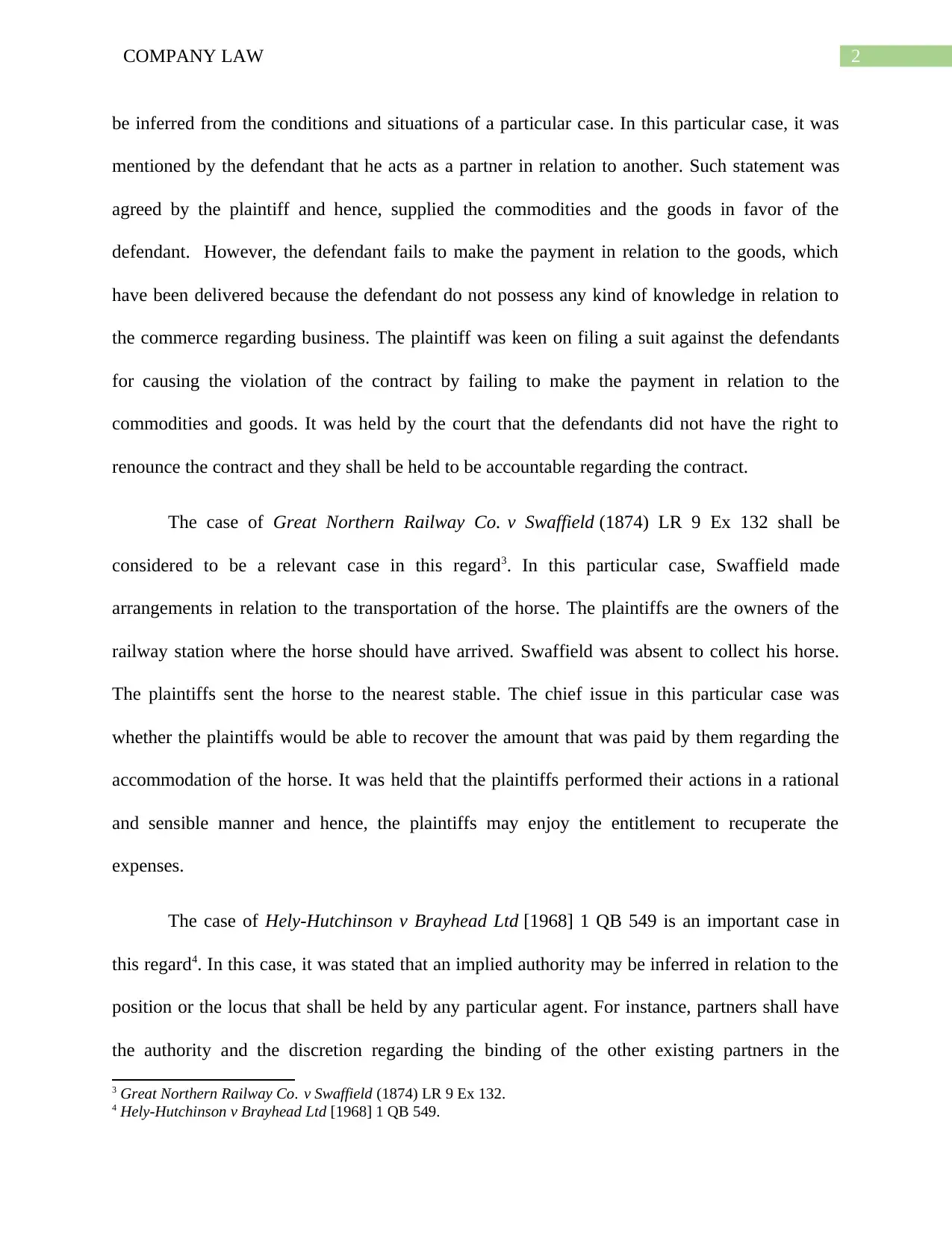
2COMPANY LAW
be inferred from the conditions and situations of a particular case. In this particular case, it was
mentioned by the defendant that he acts as a partner in relation to another. Such statement was
agreed by the plaintiff and hence, supplied the commodities and the goods in favor of the
defendant. However, the defendant fails to make the payment in relation to the goods, which
have been delivered because the defendant do not possess any kind of knowledge in relation to
the commerce regarding business. The plaintiff was keen on filing a suit against the defendants
for causing the violation of the contract by failing to make the payment in relation to the
commodities and goods. It was held by the court that the defendants did not have the right to
renounce the contract and they shall be held to be accountable regarding the contract.
The case of Great Northern Railway Co. v Swaffield (1874) LR 9 Ex 132 shall be
considered to be a relevant case in this regard3. In this particular case, Swaffield made
arrangements in relation to the transportation of the horse. The plaintiffs are the owners of the
railway station where the horse should have arrived. Swaffield was absent to collect his horse.
The plaintiffs sent the horse to the nearest stable. The chief issue in this particular case was
whether the plaintiffs would be able to recover the amount that was paid by them regarding the
accommodation of the horse. It was held that the plaintiffs performed their actions in a rational
and sensible manner and hence, the plaintiffs may enjoy the entitlement to recuperate the
expenses.
The case of Hely-Hutchinson v Brayhead Ltd [1968] 1 QB 549 is an important case in
this regard4. In this case, it was stated that an implied authority may be inferred in relation to the
position or the locus that shall be held by any particular agent. For instance, partners shall have
the authority and the discretion regarding the binding of the other existing partners in the
3 Great Northern Railway Co. v Swaffield (1874) LR 9 Ex 132.
4 Hely-Hutchinson v Brayhead Ltd [1968] 1 QB 549.
be inferred from the conditions and situations of a particular case. In this particular case, it was
mentioned by the defendant that he acts as a partner in relation to another. Such statement was
agreed by the plaintiff and hence, supplied the commodities and the goods in favor of the
defendant. However, the defendant fails to make the payment in relation to the goods, which
have been delivered because the defendant do not possess any kind of knowledge in relation to
the commerce regarding business. The plaintiff was keen on filing a suit against the defendants
for causing the violation of the contract by failing to make the payment in relation to the
commodities and goods. It was held by the court that the defendants did not have the right to
renounce the contract and they shall be held to be accountable regarding the contract.
The case of Great Northern Railway Co. v Swaffield (1874) LR 9 Ex 132 shall be
considered to be a relevant case in this regard3. In this particular case, Swaffield made
arrangements in relation to the transportation of the horse. The plaintiffs are the owners of the
railway station where the horse should have arrived. Swaffield was absent to collect his horse.
The plaintiffs sent the horse to the nearest stable. The chief issue in this particular case was
whether the plaintiffs would be able to recover the amount that was paid by them regarding the
accommodation of the horse. It was held that the plaintiffs performed their actions in a rational
and sensible manner and hence, the plaintiffs may enjoy the entitlement to recuperate the
expenses.
The case of Hely-Hutchinson v Brayhead Ltd [1968] 1 QB 549 is an important case in
this regard4. In this case, it was stated that an implied authority may be inferred in relation to the
position or the locus that shall be held by any particular agent. For instance, partners shall have
the authority and the discretion regarding the binding of the other existing partners in the
3 Great Northern Railway Co. v Swaffield (1874) LR 9 Ex 132.
4 Hely-Hutchinson v Brayhead Ltd [1968] 1 QB 549.
⊘ This is a preview!⊘
Do you want full access?
Subscribe today to unlock all pages.

Trusted by 1+ million students worldwide
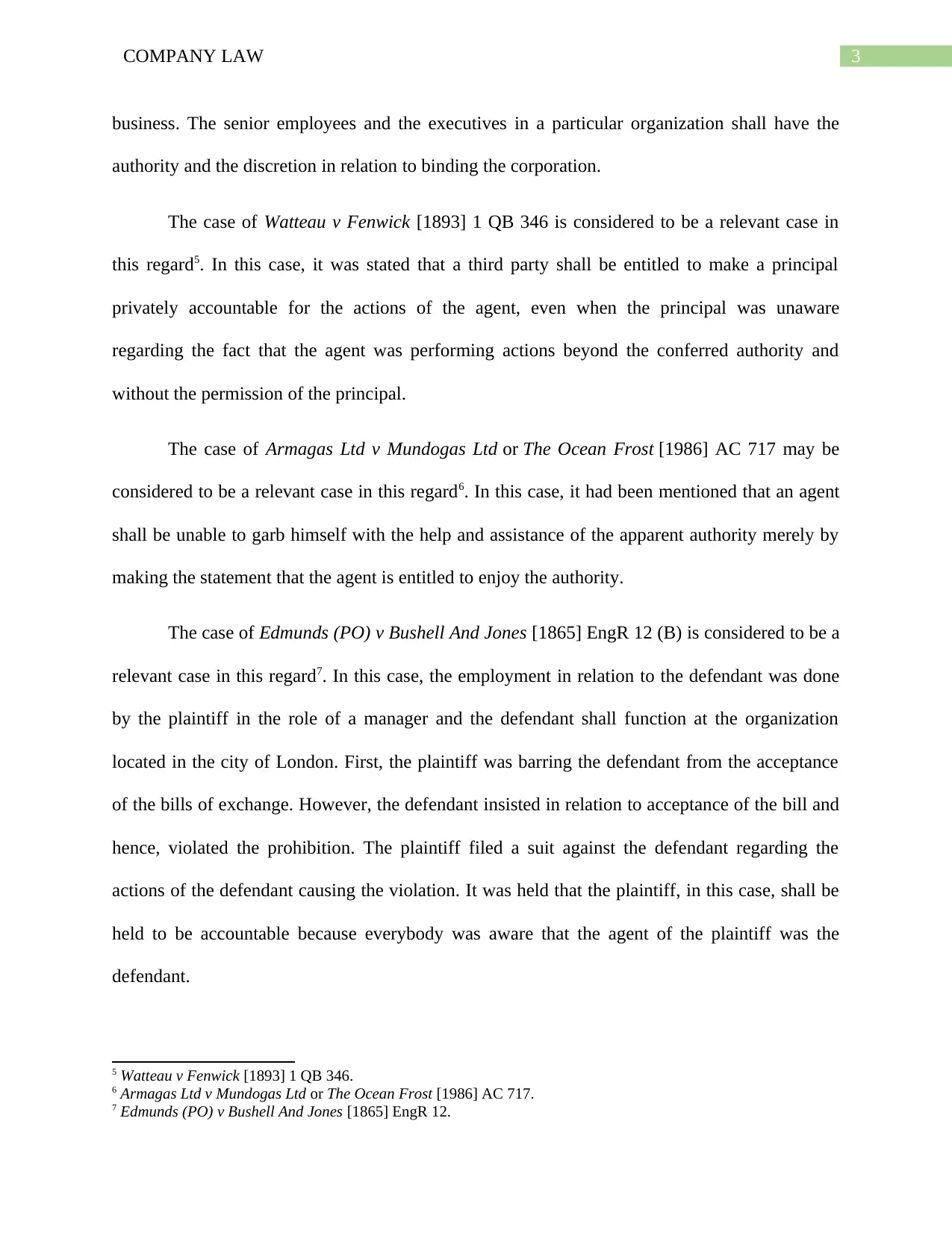
3COMPANY LAW
business. The senior employees and the executives in a particular organization shall have the
authority and the discretion in relation to binding the corporation.
The case of Watteau v Fenwick [1893] 1 QB 346 is considered to be a relevant case in
this regard5. In this case, it was stated that a third party shall be entitled to make a principal
privately accountable for the actions of the agent, even when the principal was unaware
regarding the fact that the agent was performing actions beyond the conferred authority and
without the permission of the principal.
The case of Armagas Ltd v Mundogas Ltd or The Ocean Frost [1986] AC 717 may be
considered to be a relevant case in this regard6. In this case, it had been mentioned that an agent
shall be unable to garb himself with the help and assistance of the apparent authority merely by
making the statement that the agent is entitled to enjoy the authority.
The case of Edmunds (PO) v Bushell And Jones [1865] EngR 12 (B) is considered to be a
relevant case in this regard7. In this case, the employment in relation to the defendant was done
by the plaintiff in the role of a manager and the defendant shall function at the organization
located in the city of London. First, the plaintiff was barring the defendant from the acceptance
of the bills of exchange. However, the defendant insisted in relation to acceptance of the bill and
hence, violated the prohibition. The plaintiff filed a suit against the defendant regarding the
actions of the defendant causing the violation. It was held that the plaintiff, in this case, shall be
held to be accountable because everybody was aware that the agent of the plaintiff was the
defendant.
5 Watteau v Fenwick [1893] 1 QB 346.
6 Armagas Ltd v Mundogas Ltd or The Ocean Frost [1986] AC 717.
7 Edmunds (PO) v Bushell And Jones [1865] EngR 12.
business. The senior employees and the executives in a particular organization shall have the
authority and the discretion in relation to binding the corporation.
The case of Watteau v Fenwick [1893] 1 QB 346 is considered to be a relevant case in
this regard5. In this case, it was stated that a third party shall be entitled to make a principal
privately accountable for the actions of the agent, even when the principal was unaware
regarding the fact that the agent was performing actions beyond the conferred authority and
without the permission of the principal.
The case of Armagas Ltd v Mundogas Ltd or The Ocean Frost [1986] AC 717 may be
considered to be a relevant case in this regard6. In this case, it had been mentioned that an agent
shall be unable to garb himself with the help and assistance of the apparent authority merely by
making the statement that the agent is entitled to enjoy the authority.
The case of Edmunds (PO) v Bushell And Jones [1865] EngR 12 (B) is considered to be a
relevant case in this regard7. In this case, the employment in relation to the defendant was done
by the plaintiff in the role of a manager and the defendant shall function at the organization
located in the city of London. First, the plaintiff was barring the defendant from the acceptance
of the bills of exchange. However, the defendant insisted in relation to acceptance of the bill and
hence, violated the prohibition. The plaintiff filed a suit against the defendant regarding the
actions of the defendant causing the violation. It was held that the plaintiff, in this case, shall be
held to be accountable because everybody was aware that the agent of the plaintiff was the
defendant.
5 Watteau v Fenwick [1893] 1 QB 346.
6 Armagas Ltd v Mundogas Ltd or The Ocean Frost [1986] AC 717.
7 Edmunds (PO) v Bushell And Jones [1865] EngR 12.
Paraphrase This Document
Need a fresh take? Get an instant paraphrase of this document with our AI Paraphraser
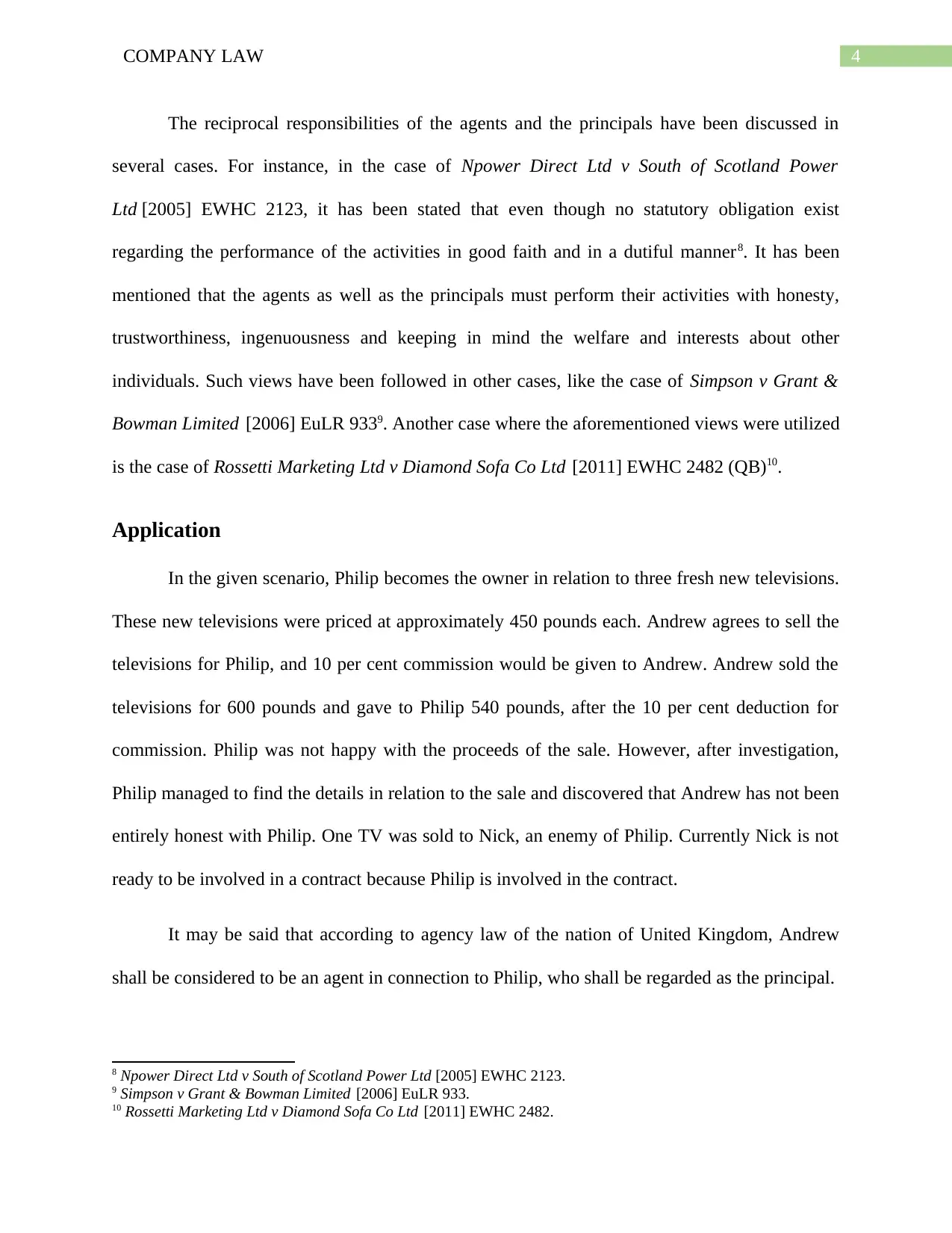
4COMPANY LAW
The reciprocal responsibilities of the agents and the principals have been discussed in
several cases. For instance, in the case of Npower Direct Ltd v South of Scotland Power
Ltd [2005] EWHC 2123, it has been stated that even though no statutory obligation exist
regarding the performance of the activities in good faith and in a dutiful manner8. It has been
mentioned that the agents as well as the principals must perform their activities with honesty,
trustworthiness, ingenuousness and keeping in mind the welfare and interests about other
individuals. Such views have been followed in other cases, like the case of Simpson v Grant &
Bowman Limited [2006] EuLR 9339. Another case where the aforementioned views were utilized
is the case of Rossetti Marketing Ltd v Diamond Sofa Co Ltd [2011] EWHC 2482 (QB)10.
Application
In the given scenario, Philip becomes the owner in relation to three fresh new televisions.
These new televisions were priced at approximately 450 pounds each. Andrew agrees to sell the
televisions for Philip, and 10 per cent commission would be given to Andrew. Andrew sold the
televisions for 600 pounds and gave to Philip 540 pounds, after the 10 per cent deduction for
commission. Philip was not happy with the proceeds of the sale. However, after investigation,
Philip managed to find the details in relation to the sale and discovered that Andrew has not been
entirely honest with Philip. One TV was sold to Nick, an enemy of Philip. Currently Nick is not
ready to be involved in a contract because Philip is involved in the contract.
It may be said that according to agency law of the nation of United Kingdom, Andrew
shall be considered to be an agent in connection to Philip, who shall be regarded as the principal.
8 Npower Direct Ltd v South of Scotland Power Ltd [2005] EWHC 2123.
9 Simpson v Grant & Bowman Limited [2006] EuLR 933.
10 Rossetti Marketing Ltd v Diamond Sofa Co Ltd [2011] EWHC 2482.
The reciprocal responsibilities of the agents and the principals have been discussed in
several cases. For instance, in the case of Npower Direct Ltd v South of Scotland Power
Ltd [2005] EWHC 2123, it has been stated that even though no statutory obligation exist
regarding the performance of the activities in good faith and in a dutiful manner8. It has been
mentioned that the agents as well as the principals must perform their activities with honesty,
trustworthiness, ingenuousness and keeping in mind the welfare and interests about other
individuals. Such views have been followed in other cases, like the case of Simpson v Grant &
Bowman Limited [2006] EuLR 9339. Another case where the aforementioned views were utilized
is the case of Rossetti Marketing Ltd v Diamond Sofa Co Ltd [2011] EWHC 2482 (QB)10.
Application
In the given scenario, Philip becomes the owner in relation to three fresh new televisions.
These new televisions were priced at approximately 450 pounds each. Andrew agrees to sell the
televisions for Philip, and 10 per cent commission would be given to Andrew. Andrew sold the
televisions for 600 pounds and gave to Philip 540 pounds, after the 10 per cent deduction for
commission. Philip was not happy with the proceeds of the sale. However, after investigation,
Philip managed to find the details in relation to the sale and discovered that Andrew has not been
entirely honest with Philip. One TV was sold to Nick, an enemy of Philip. Currently Nick is not
ready to be involved in a contract because Philip is involved in the contract.
It may be said that according to agency law of the nation of United Kingdom, Andrew
shall be considered to be an agent in connection to Philip, who shall be regarded as the principal.
8 Npower Direct Ltd v South of Scotland Power Ltd [2005] EWHC 2123.
9 Simpson v Grant & Bowman Limited [2006] EuLR 933.
10 Rossetti Marketing Ltd v Diamond Sofa Co Ltd [2011] EWHC 2482.
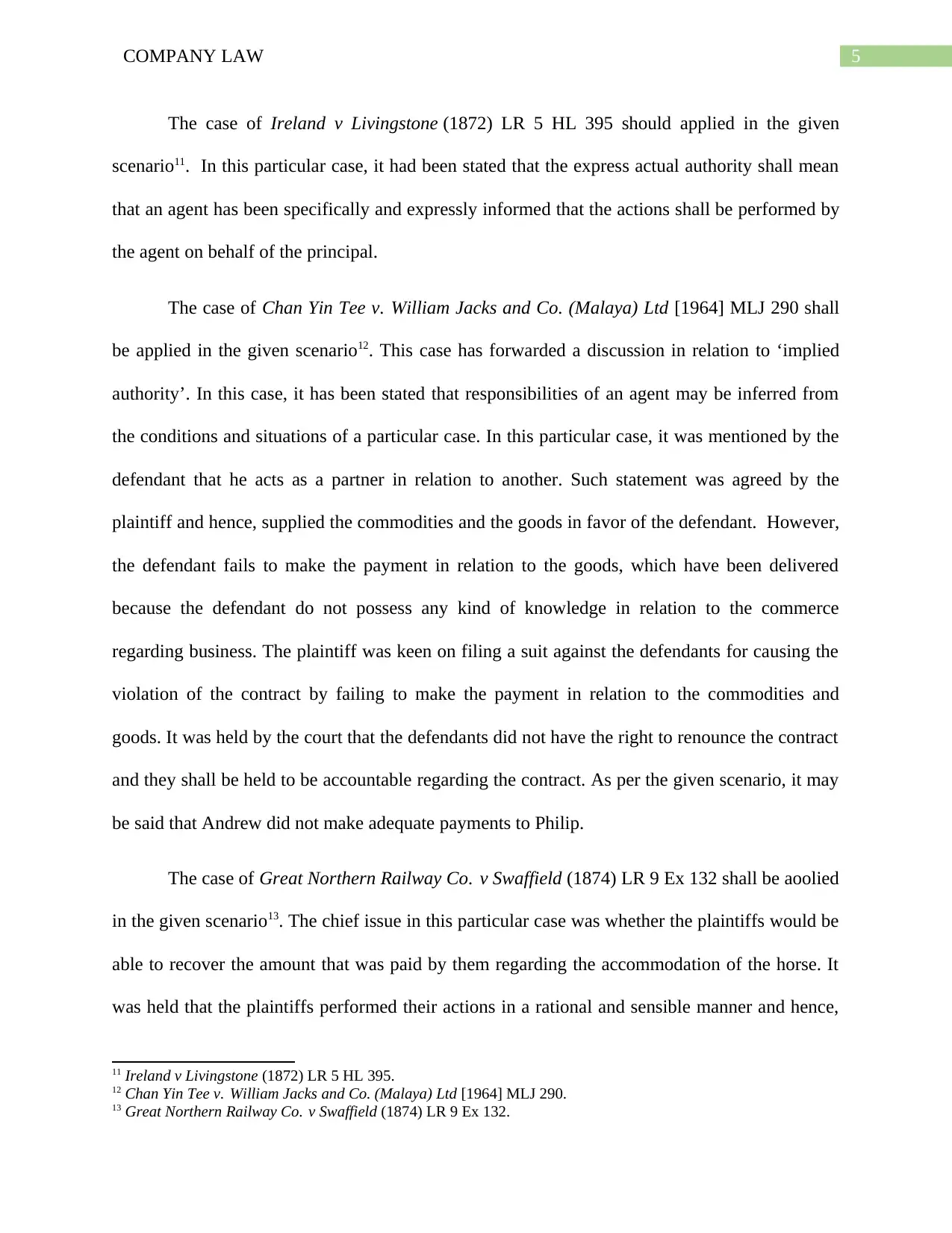
5COMPANY LAW
The case of Ireland v Livingstone (1872) LR 5 HL 395 should applied in the given
scenario11. In this particular case, it had been stated that the express actual authority shall mean
that an agent has been specifically and expressly informed that the actions shall be performed by
the agent on behalf of the principal.
The case of Chan Yin Tee v. William Jacks and Co. (Malaya) Ltd [1964] MLJ 290 shall
be applied in the given scenario12. This case has forwarded a discussion in relation to ‘implied
authority’. In this case, it has been stated that responsibilities of an agent may be inferred from
the conditions and situations of a particular case. In this particular case, it was mentioned by the
defendant that he acts as a partner in relation to another. Such statement was agreed by the
plaintiff and hence, supplied the commodities and the goods in favor of the defendant. However,
the defendant fails to make the payment in relation to the goods, which have been delivered
because the defendant do not possess any kind of knowledge in relation to the commerce
regarding business. The plaintiff was keen on filing a suit against the defendants for causing the
violation of the contract by failing to make the payment in relation to the commodities and
goods. It was held by the court that the defendants did not have the right to renounce the contract
and they shall be held to be accountable regarding the contract. As per the given scenario, it may
be said that Andrew did not make adequate payments to Philip.
The case of Great Northern Railway Co. v Swaffield (1874) LR 9 Ex 132 shall be aoolied
in the given scenario13. The chief issue in this particular case was whether the plaintiffs would be
able to recover the amount that was paid by them regarding the accommodation of the horse. It
was held that the plaintiffs performed their actions in a rational and sensible manner and hence,
11 Ireland v Livingstone (1872) LR 5 HL 395.
12 Chan Yin Tee v. William Jacks and Co. (Malaya) Ltd [1964] MLJ 290.
13 Great Northern Railway Co. v Swaffield (1874) LR 9 Ex 132.
The case of Ireland v Livingstone (1872) LR 5 HL 395 should applied in the given
scenario11. In this particular case, it had been stated that the express actual authority shall mean
that an agent has been specifically and expressly informed that the actions shall be performed by
the agent on behalf of the principal.
The case of Chan Yin Tee v. William Jacks and Co. (Malaya) Ltd [1964] MLJ 290 shall
be applied in the given scenario12. This case has forwarded a discussion in relation to ‘implied
authority’. In this case, it has been stated that responsibilities of an agent may be inferred from
the conditions and situations of a particular case. In this particular case, it was mentioned by the
defendant that he acts as a partner in relation to another. Such statement was agreed by the
plaintiff and hence, supplied the commodities and the goods in favor of the defendant. However,
the defendant fails to make the payment in relation to the goods, which have been delivered
because the defendant do not possess any kind of knowledge in relation to the commerce
regarding business. The plaintiff was keen on filing a suit against the defendants for causing the
violation of the contract by failing to make the payment in relation to the commodities and
goods. It was held by the court that the defendants did not have the right to renounce the contract
and they shall be held to be accountable regarding the contract. As per the given scenario, it may
be said that Andrew did not make adequate payments to Philip.
The case of Great Northern Railway Co. v Swaffield (1874) LR 9 Ex 132 shall be aoolied
in the given scenario13. The chief issue in this particular case was whether the plaintiffs would be
able to recover the amount that was paid by them regarding the accommodation of the horse. It
was held that the plaintiffs performed their actions in a rational and sensible manner and hence,
11 Ireland v Livingstone (1872) LR 5 HL 395.
12 Chan Yin Tee v. William Jacks and Co. (Malaya) Ltd [1964] MLJ 290.
13 Great Northern Railway Co. v Swaffield (1874) LR 9 Ex 132.
⊘ This is a preview!⊘
Do you want full access?
Subscribe today to unlock all pages.

Trusted by 1+ million students worldwide
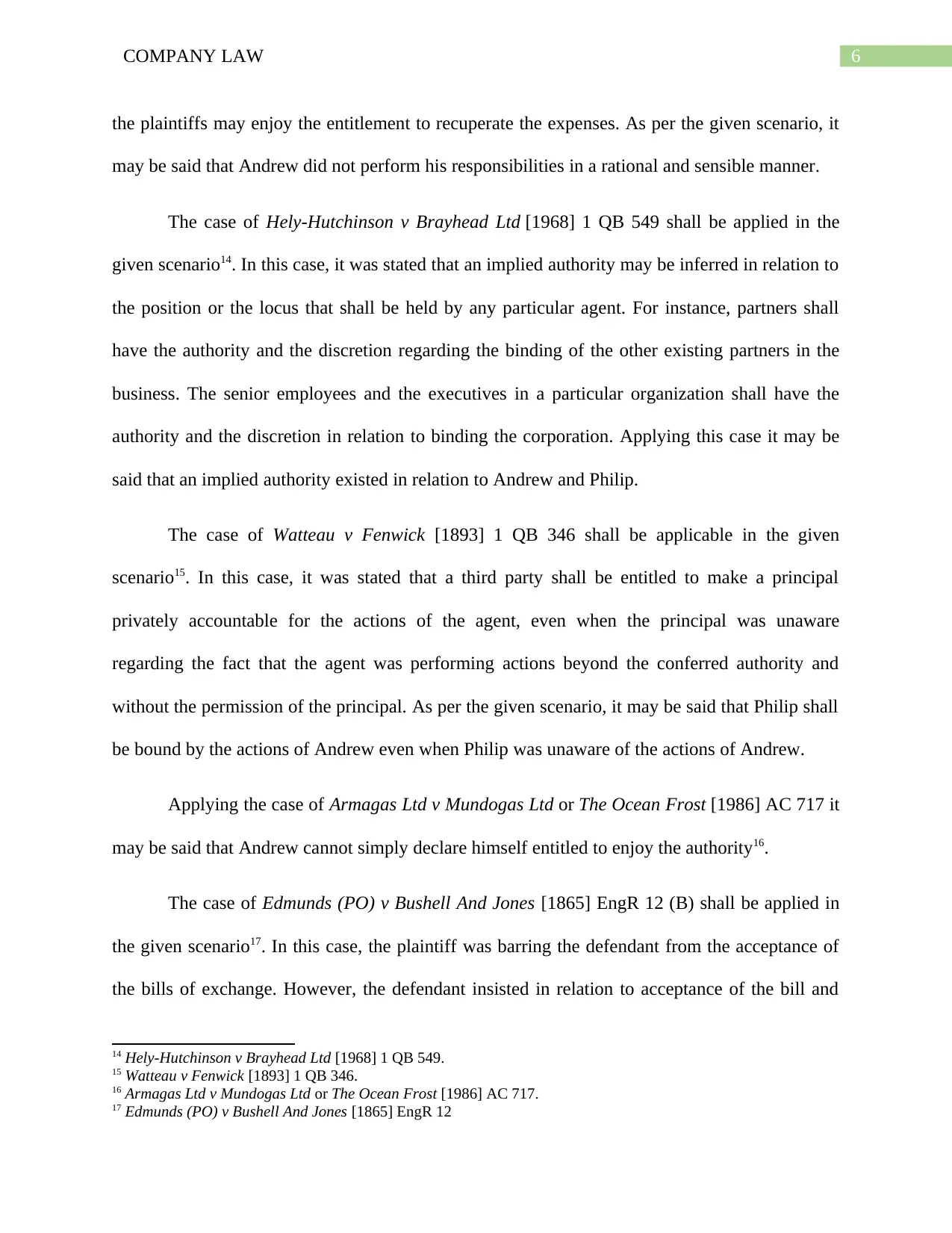
6COMPANY LAW
the plaintiffs may enjoy the entitlement to recuperate the expenses. As per the given scenario, it
may be said that Andrew did not perform his responsibilities in a rational and sensible manner.
The case of Hely-Hutchinson v Brayhead Ltd [1968] 1 QB 549 shall be applied in the
given scenario14. In this case, it was stated that an implied authority may be inferred in relation to
the position or the locus that shall be held by any particular agent. For instance, partners shall
have the authority and the discretion regarding the binding of the other existing partners in the
business. The senior employees and the executives in a particular organization shall have the
authority and the discretion in relation to binding the corporation. Applying this case it may be
said that an implied authority existed in relation to Andrew and Philip.
The case of Watteau v Fenwick [1893] 1 QB 346 shall be applicable in the given
scenario15. In this case, it was stated that a third party shall be entitled to make a principal
privately accountable for the actions of the agent, even when the principal was unaware
regarding the fact that the agent was performing actions beyond the conferred authority and
without the permission of the principal. As per the given scenario, it may be said that Philip shall
be bound by the actions of Andrew even when Philip was unaware of the actions of Andrew.
Applying the case of Armagas Ltd v Mundogas Ltd or The Ocean Frost [1986] AC 717 it
may be said that Andrew cannot simply declare himself entitled to enjoy the authority16.
The case of Edmunds (PO) v Bushell And Jones [1865] EngR 12 (B) shall be applied in
the given scenario17. In this case, the plaintiff was barring the defendant from the acceptance of
the bills of exchange. However, the defendant insisted in relation to acceptance of the bill and
14 Hely-Hutchinson v Brayhead Ltd [1968] 1 QB 549.
15 Watteau v Fenwick [1893] 1 QB 346.
16 Armagas Ltd v Mundogas Ltd or The Ocean Frost [1986] AC 717.
17 Edmunds (PO) v Bushell And Jones [1865] EngR 12
the plaintiffs may enjoy the entitlement to recuperate the expenses. As per the given scenario, it
may be said that Andrew did not perform his responsibilities in a rational and sensible manner.
The case of Hely-Hutchinson v Brayhead Ltd [1968] 1 QB 549 shall be applied in the
given scenario14. In this case, it was stated that an implied authority may be inferred in relation to
the position or the locus that shall be held by any particular agent. For instance, partners shall
have the authority and the discretion regarding the binding of the other existing partners in the
business. The senior employees and the executives in a particular organization shall have the
authority and the discretion in relation to binding the corporation. Applying this case it may be
said that an implied authority existed in relation to Andrew and Philip.
The case of Watteau v Fenwick [1893] 1 QB 346 shall be applicable in the given
scenario15. In this case, it was stated that a third party shall be entitled to make a principal
privately accountable for the actions of the agent, even when the principal was unaware
regarding the fact that the agent was performing actions beyond the conferred authority and
without the permission of the principal. As per the given scenario, it may be said that Philip shall
be bound by the actions of Andrew even when Philip was unaware of the actions of Andrew.
Applying the case of Armagas Ltd v Mundogas Ltd or The Ocean Frost [1986] AC 717 it
may be said that Andrew cannot simply declare himself entitled to enjoy the authority16.
The case of Edmunds (PO) v Bushell And Jones [1865] EngR 12 (B) shall be applied in
the given scenario17. In this case, the plaintiff was barring the defendant from the acceptance of
the bills of exchange. However, the defendant insisted in relation to acceptance of the bill and
14 Hely-Hutchinson v Brayhead Ltd [1968] 1 QB 549.
15 Watteau v Fenwick [1893] 1 QB 346.
16 Armagas Ltd v Mundogas Ltd or The Ocean Frost [1986] AC 717.
17 Edmunds (PO) v Bushell And Jones [1865] EngR 12
Paraphrase This Document
Need a fresh take? Get an instant paraphrase of this document with our AI Paraphraser
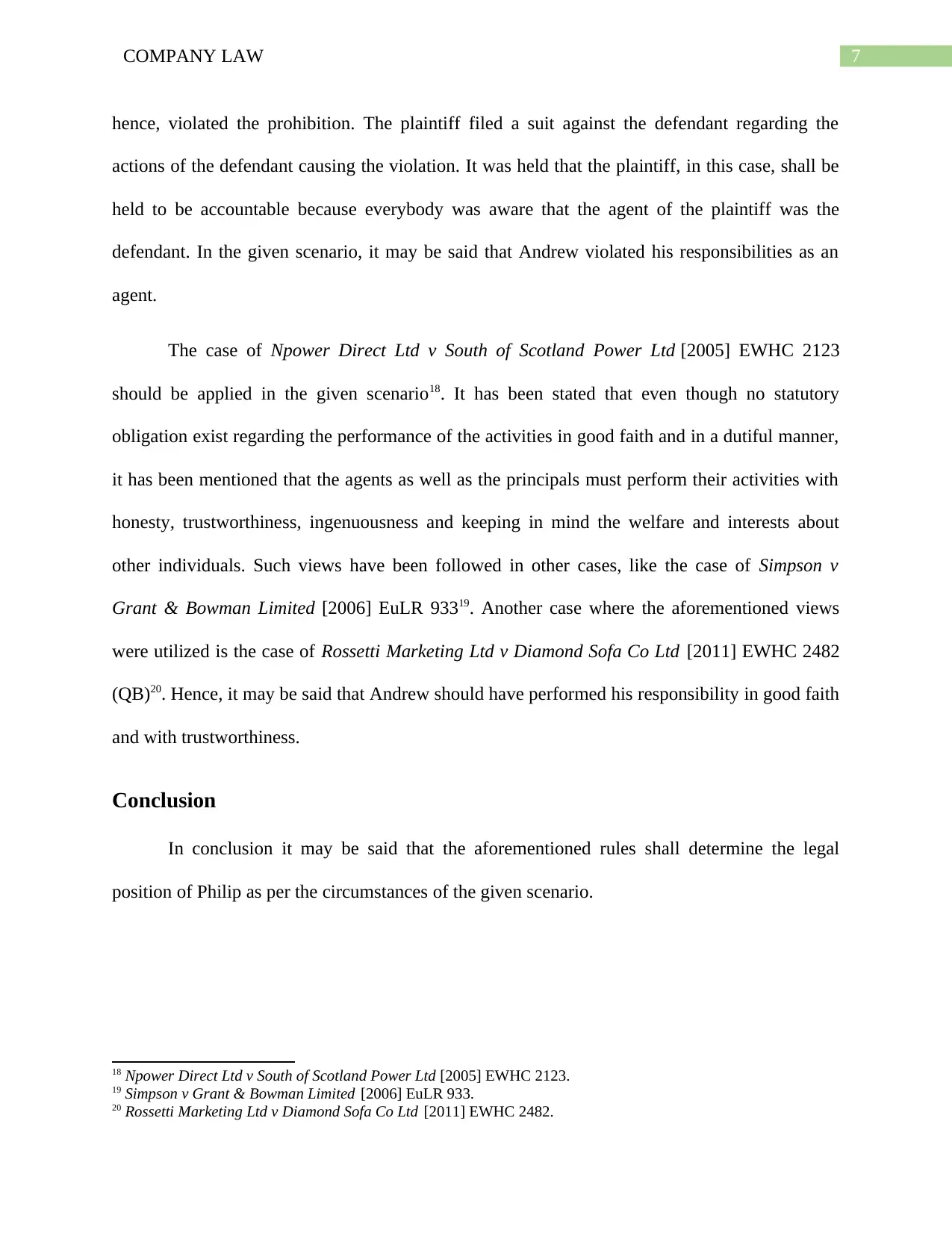
7COMPANY LAW
hence, violated the prohibition. The plaintiff filed a suit against the defendant regarding the
actions of the defendant causing the violation. It was held that the plaintiff, in this case, shall be
held to be accountable because everybody was aware that the agent of the plaintiff was the
defendant. In the given scenario, it may be said that Andrew violated his responsibilities as an
agent.
The case of Npower Direct Ltd v South of Scotland Power Ltd [2005] EWHC 2123
should be applied in the given scenario18. It has been stated that even though no statutory
obligation exist regarding the performance of the activities in good faith and in a dutiful manner,
it has been mentioned that the agents as well as the principals must perform their activities with
honesty, trustworthiness, ingenuousness and keeping in mind the welfare and interests about
other individuals. Such views have been followed in other cases, like the case of Simpson v
Grant & Bowman Limited [2006] EuLR 93319. Another case where the aforementioned views
were utilized is the case of Rossetti Marketing Ltd v Diamond Sofa Co Ltd [2011] EWHC 2482
(QB)20. Hence, it may be said that Andrew should have performed his responsibility in good faith
and with trustworthiness.
Conclusion
In conclusion it may be said that the aforementioned rules shall determine the legal
position of Philip as per the circumstances of the given scenario.
18 Npower Direct Ltd v South of Scotland Power Ltd [2005] EWHC 2123.
19 Simpson v Grant & Bowman Limited [2006] EuLR 933.
20 Rossetti Marketing Ltd v Diamond Sofa Co Ltd [2011] EWHC 2482.
hence, violated the prohibition. The plaintiff filed a suit against the defendant regarding the
actions of the defendant causing the violation. It was held that the plaintiff, in this case, shall be
held to be accountable because everybody was aware that the agent of the plaintiff was the
defendant. In the given scenario, it may be said that Andrew violated his responsibilities as an
agent.
The case of Npower Direct Ltd v South of Scotland Power Ltd [2005] EWHC 2123
should be applied in the given scenario18. It has been stated that even though no statutory
obligation exist regarding the performance of the activities in good faith and in a dutiful manner,
it has been mentioned that the agents as well as the principals must perform their activities with
honesty, trustworthiness, ingenuousness and keeping in mind the welfare and interests about
other individuals. Such views have been followed in other cases, like the case of Simpson v
Grant & Bowman Limited [2006] EuLR 93319. Another case where the aforementioned views
were utilized is the case of Rossetti Marketing Ltd v Diamond Sofa Co Ltd [2011] EWHC 2482
(QB)20. Hence, it may be said that Andrew should have performed his responsibility in good faith
and with trustworthiness.
Conclusion
In conclusion it may be said that the aforementioned rules shall determine the legal
position of Philip as per the circumstances of the given scenario.
18 Npower Direct Ltd v South of Scotland Power Ltd [2005] EWHC 2123.
19 Simpson v Grant & Bowman Limited [2006] EuLR 933.
20 Rossetti Marketing Ltd v Diamond Sofa Co Ltd [2011] EWHC 2482.
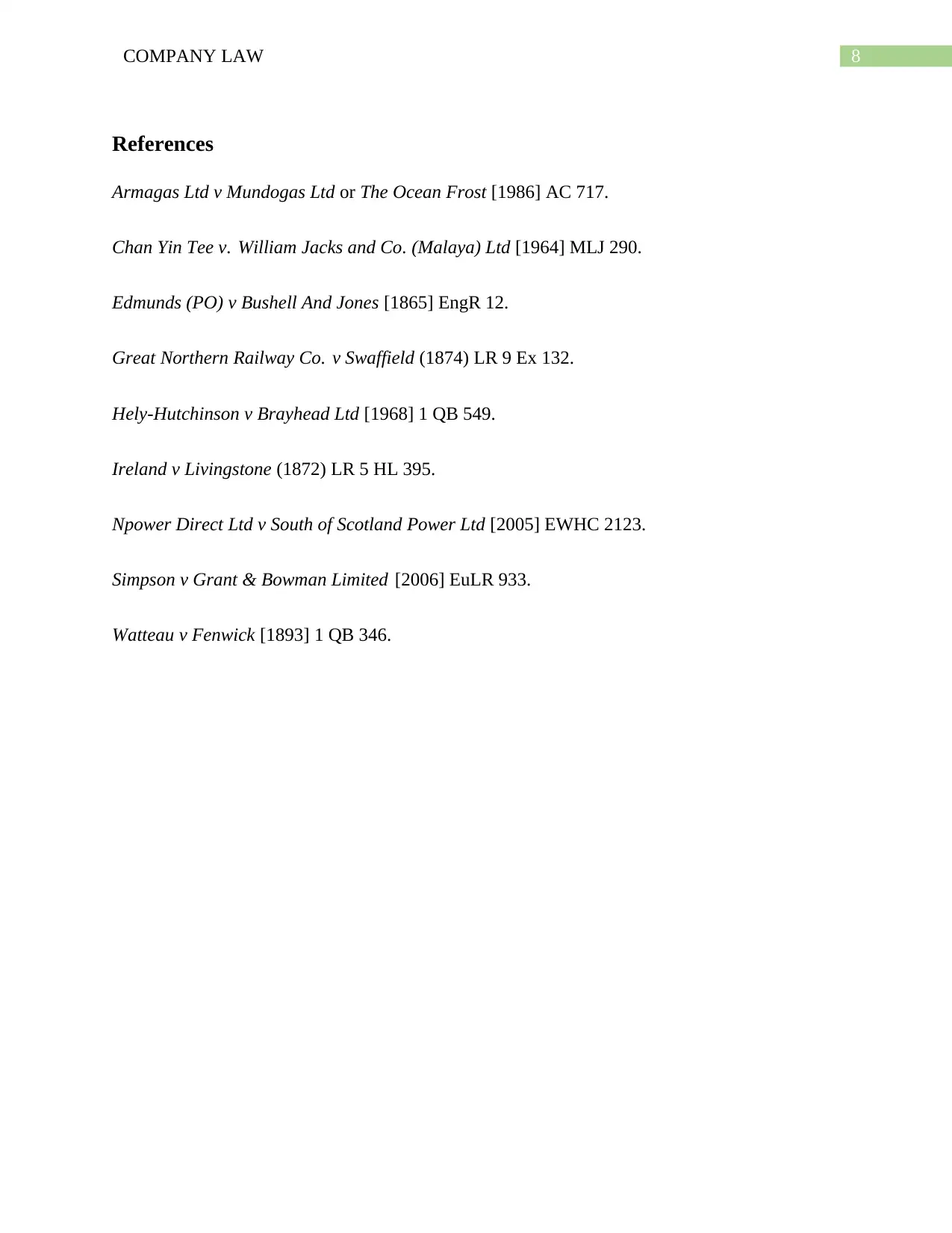
8COMPANY LAW
References
Armagas Ltd v Mundogas Ltd or The Ocean Frost [1986] AC 717.
Chan Yin Tee v. William Jacks and Co. (Malaya) Ltd [1964] MLJ 290.
Edmunds (PO) v Bushell And Jones [1865] EngR 12.
Great Northern Railway Co. v Swaffield (1874) LR 9 Ex 132.
Hely-Hutchinson v Brayhead Ltd [1968] 1 QB 549.
Ireland v Livingstone (1872) LR 5 HL 395.
Npower Direct Ltd v South of Scotland Power Ltd [2005] EWHC 2123.
Simpson v Grant & Bowman Limited [2006] EuLR 933.
Watteau v Fenwick [1893] 1 QB 346.
References
Armagas Ltd v Mundogas Ltd or The Ocean Frost [1986] AC 717.
Chan Yin Tee v. William Jacks and Co. (Malaya) Ltd [1964] MLJ 290.
Edmunds (PO) v Bushell And Jones [1865] EngR 12.
Great Northern Railway Co. v Swaffield (1874) LR 9 Ex 132.
Hely-Hutchinson v Brayhead Ltd [1968] 1 QB 549.
Ireland v Livingstone (1872) LR 5 HL 395.
Npower Direct Ltd v South of Scotland Power Ltd [2005] EWHC 2123.
Simpson v Grant & Bowman Limited [2006] EuLR 933.
Watteau v Fenwick [1893] 1 QB 346.
⊘ This is a preview!⊘
Do you want full access?
Subscribe today to unlock all pages.

Trusted by 1+ million students worldwide
1 out of 9
Related Documents
Your All-in-One AI-Powered Toolkit for Academic Success.
+13062052269
info@desklib.com
Available 24*7 on WhatsApp / Email
![[object Object]](/_next/static/media/star-bottom.7253800d.svg)
Unlock your academic potential
Copyright © 2020–2026 A2Z Services. All Rights Reserved. Developed and managed by ZUCOL.





